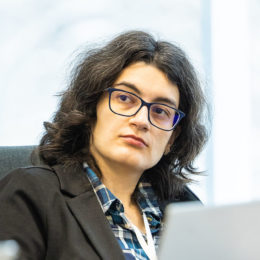Questions whether science should be value-free, or whether value influences are inevitable have been an important topic of investigation in the philosophy of science. Values in this sense can be social, political, ethical, or economic.
Elena Popa
Despite these debates, the question how decisions by scientists can propagate structural injustices and inequality has received little philosophical attention so far. In the context of public health, the COVID-19 pandemic has brought this problem into the spotlight. Public health decisions do not affect everyone equally, and can inflict harm on those in precarious economic conditions, through unemployment, diminished access to education or other medical services etc. With the availability of vaccines, the COVID-19 context has highlighted another related issue: that of trust in science. Low levels of trust in science and, more broadly, in institutions have been correlated with lower levels of compliance with recommendations by scientists or the authorities. Explanations of vaccine hesitancy in terms of a crisis of trust further highlight the need to consider justice and equity in order to improve the outcomes of public health decisions.
This project approaches this problem from a philosophical perspective. I will provide two arguments for the incorporation of justice and equity in public health decisions in conditions of uncertainty, and also more broadly, in connection to trust. Another argument will look at questions of evidence: in order to incorporate information about vulnerable or marginalized groups in scientific models, knowledge about the said groups is needed. Thus, more diverse methods and sources of evidence are required, to shed light onto previous blind spots. I will then apply this framework to two cases in public health: vaccine hesitancy and maternal and child health. Regarding the former, I will argue that adopting a framework where values are transparent and justice and equity are prioritized can help address vaccine hesitancy, by increasing trust. Regarding the latter, I will argue against contemporary tendencies of conceptualizing fetal health as the mother’s individual responsibility. As an alternative, I will argue that a framework of values including justice can highlight the need to address environmental degradation and its effects nutrition, as well as the need for further social support for mothers that are disproportionately affected by this. These cases will serve as illustrations of my overall claim that scientists should opt for approaches leading to more equitable outcomes for the people concerned, or, when this is impossible, supplement their recommendations with measures that address resulting inequalities.
Project details
Project title: Values, Trust, and Decision Making in Public Health
Principal Investigator: dr Elena Popa
Host institution: Jagiellonian University in Cracow
Project duration: 01.11.2022 – 31.10.2024
Project’s website: www.incet.uj.edu.pl/en_GB/polonez-bis-values-trust

